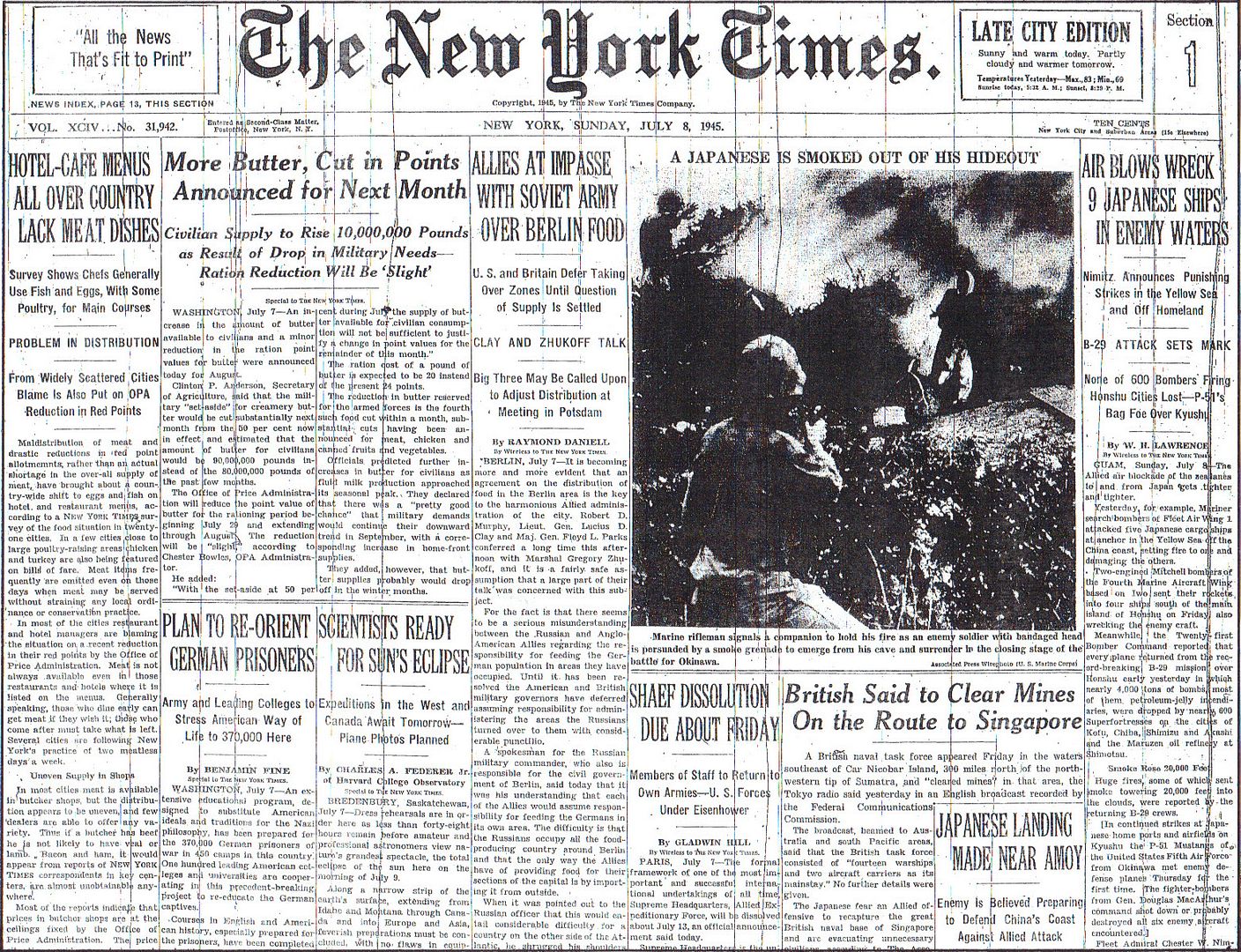
Posted on 07/08/2015 4:46:31 AM PDT by Homer_J_Simpson

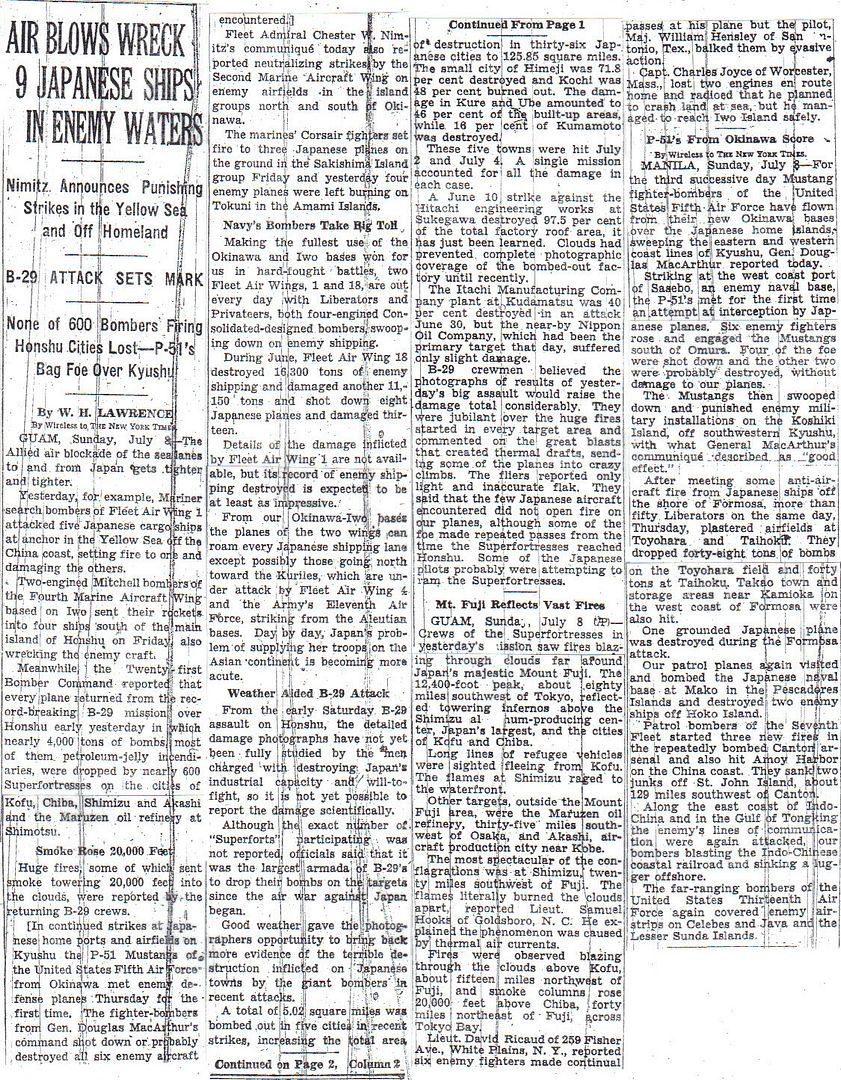
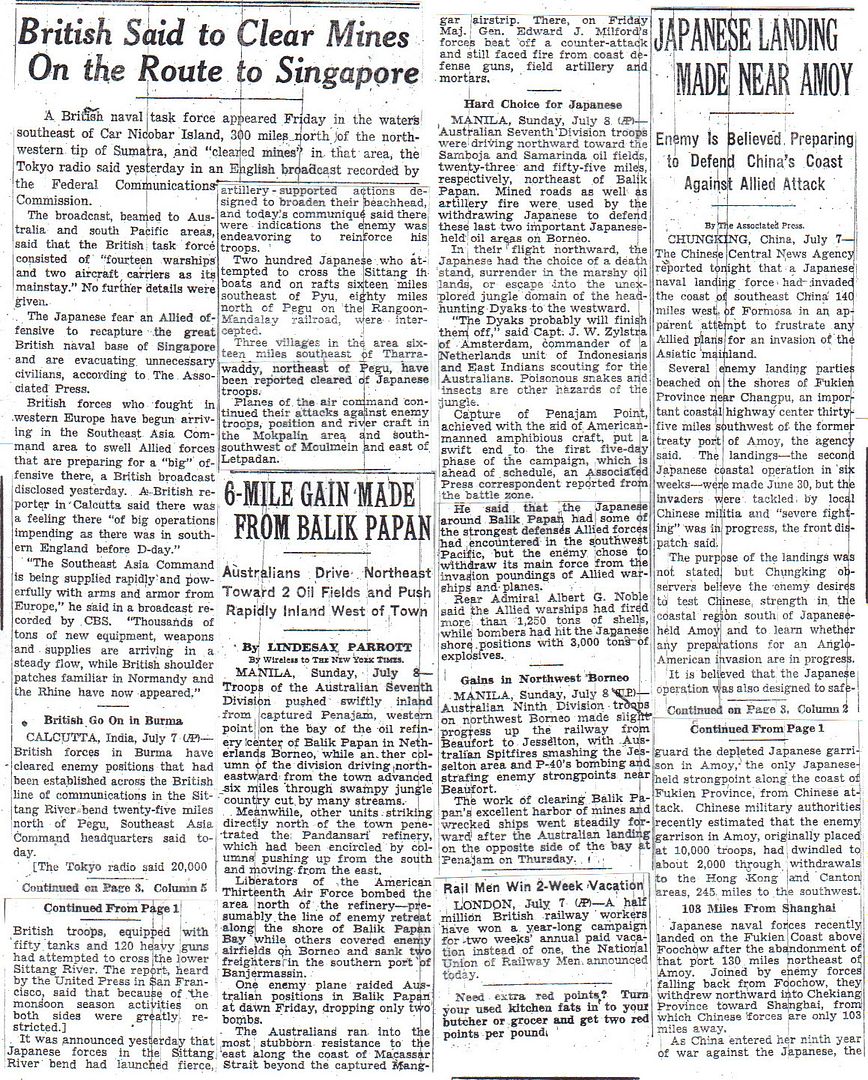
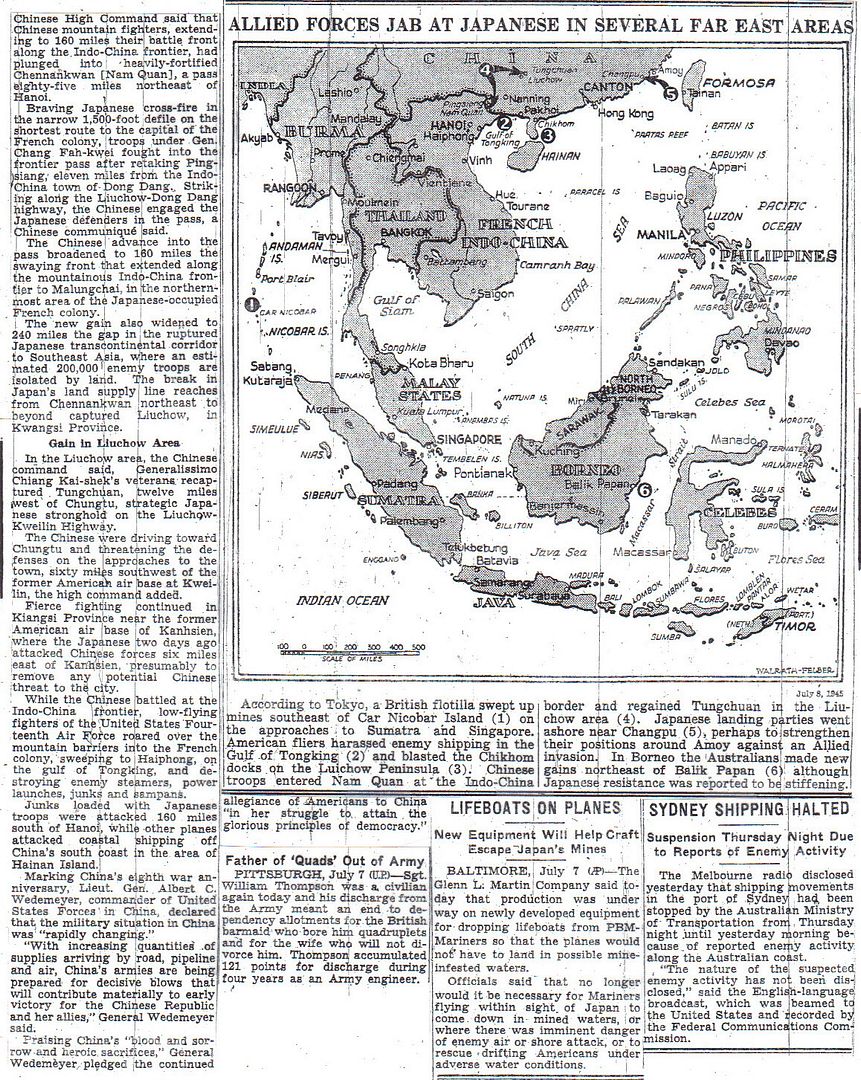
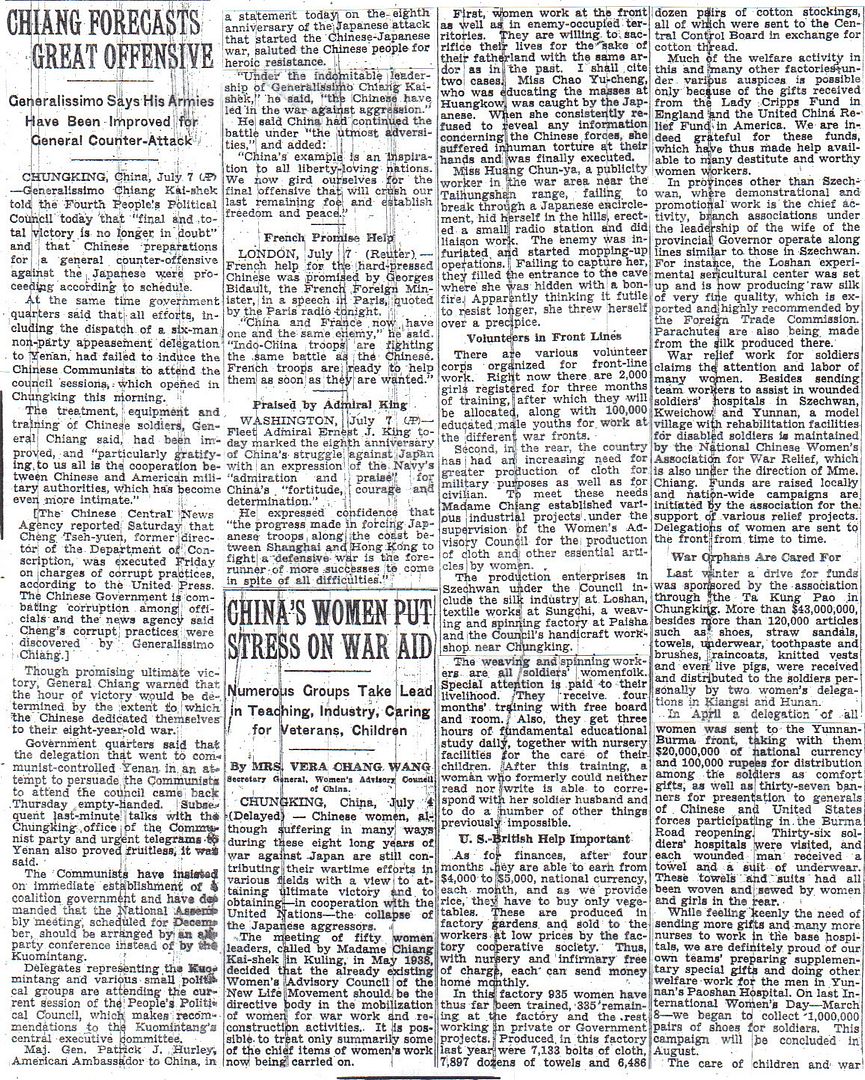
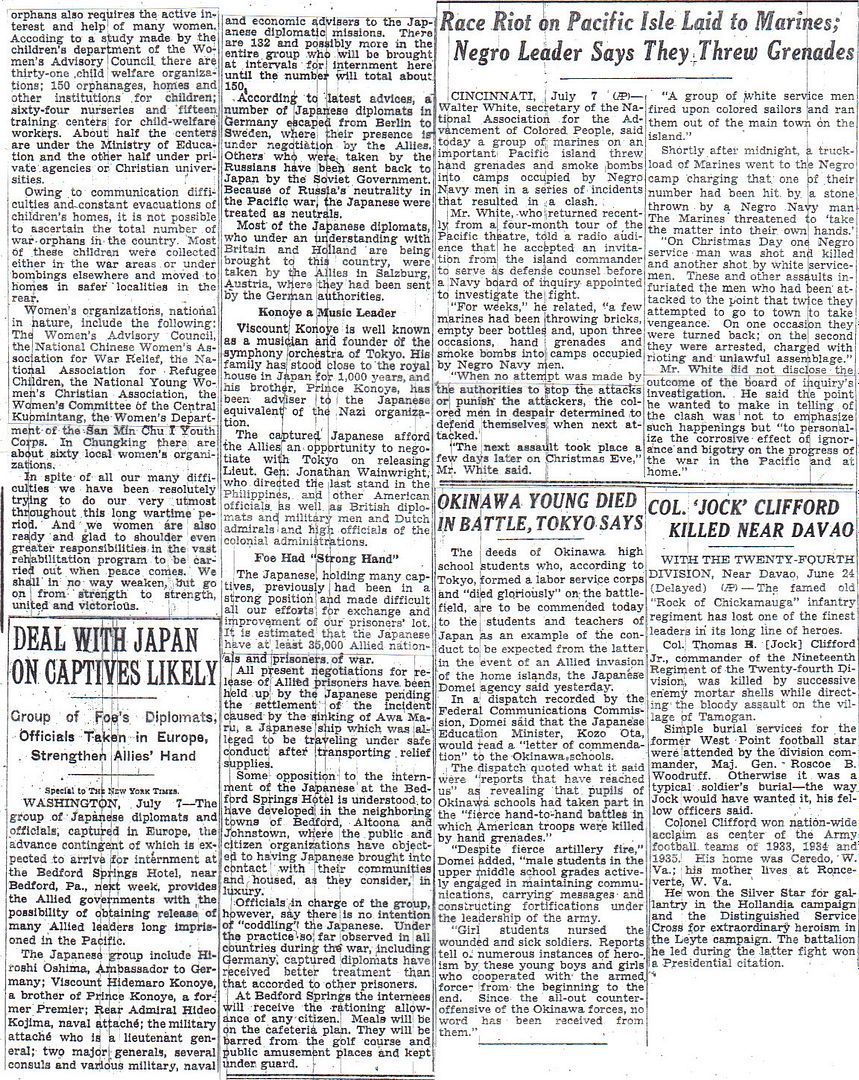
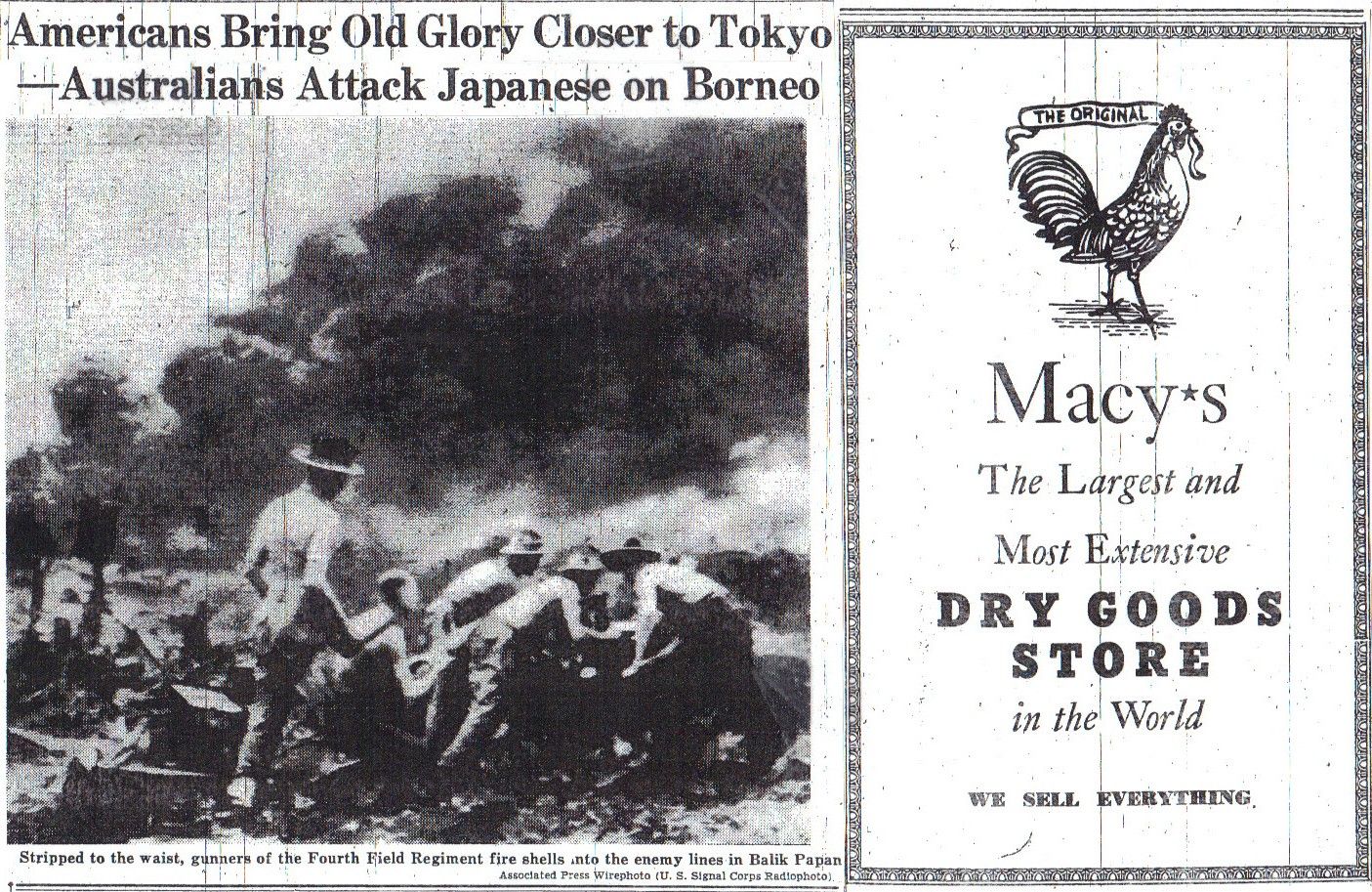
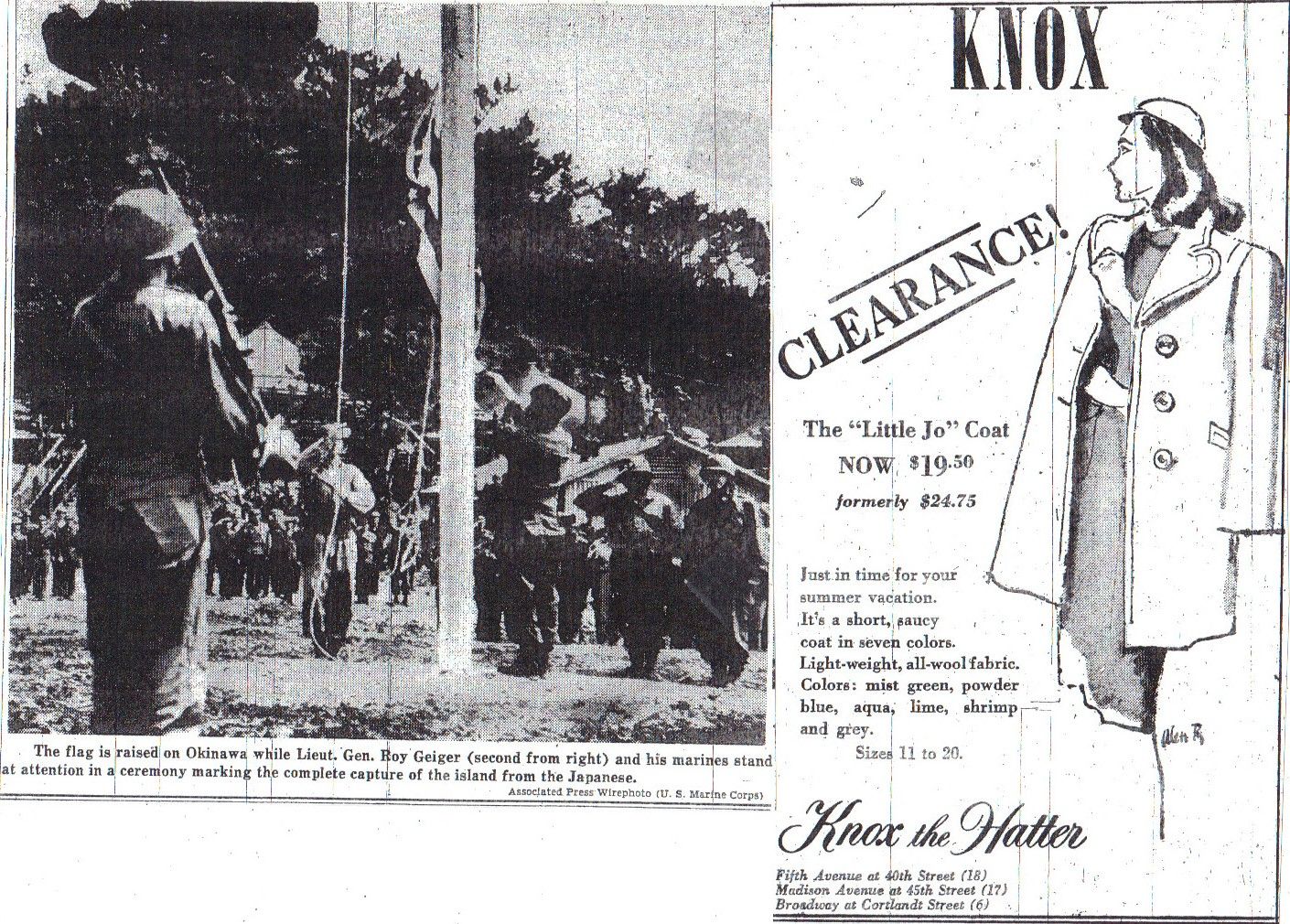
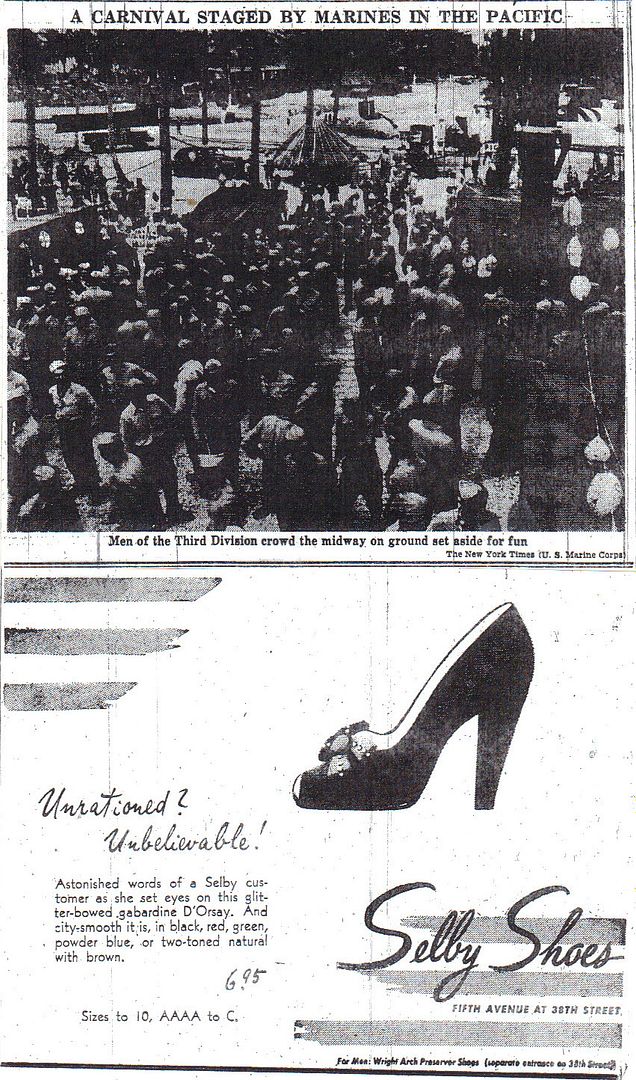
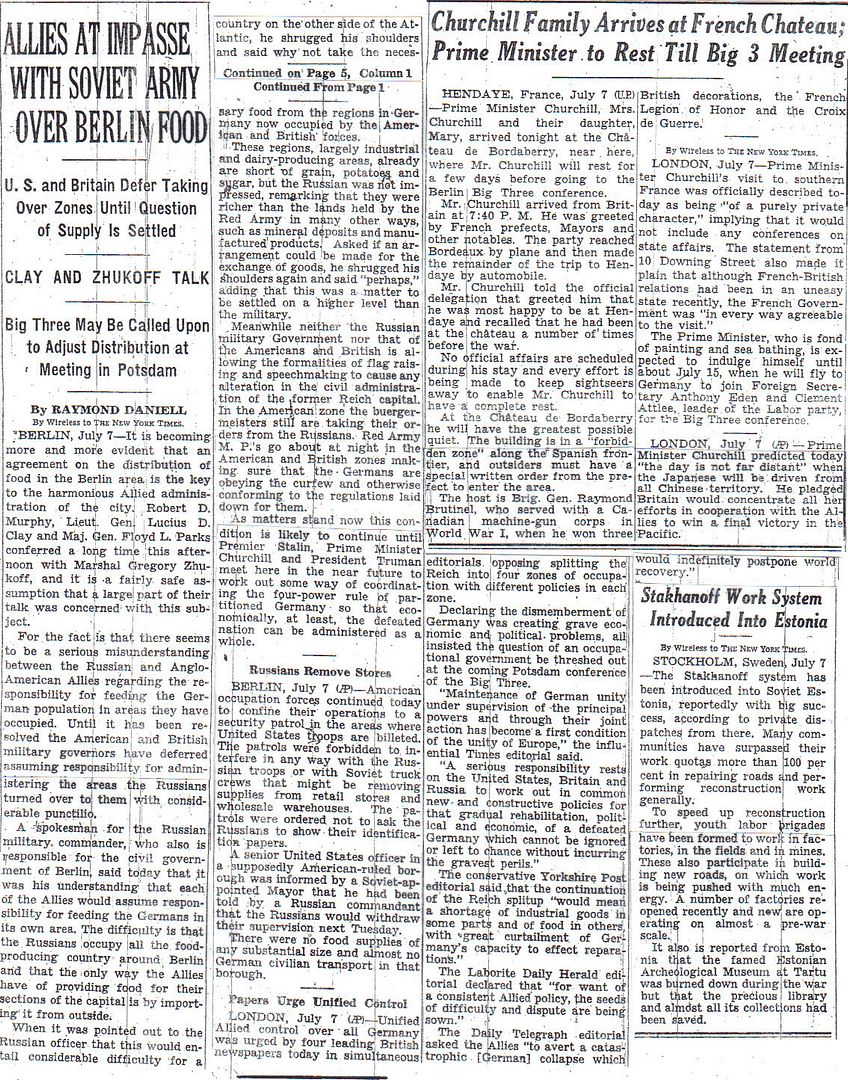
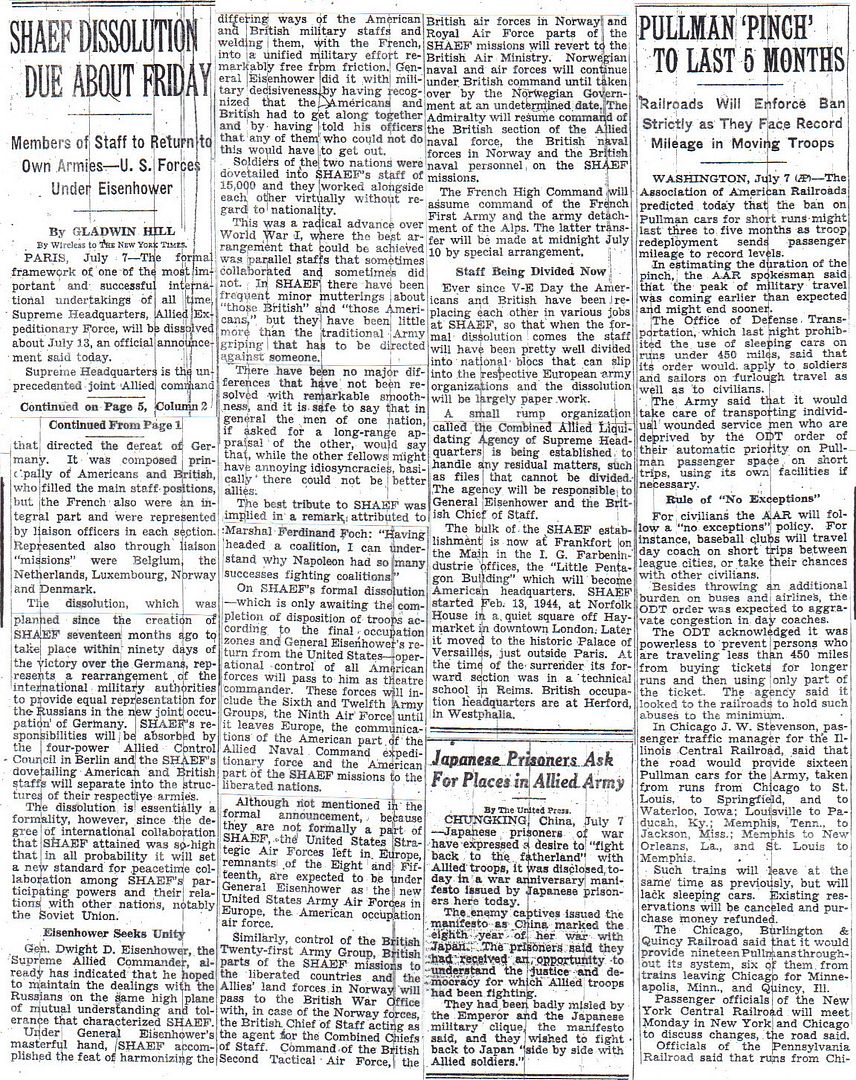
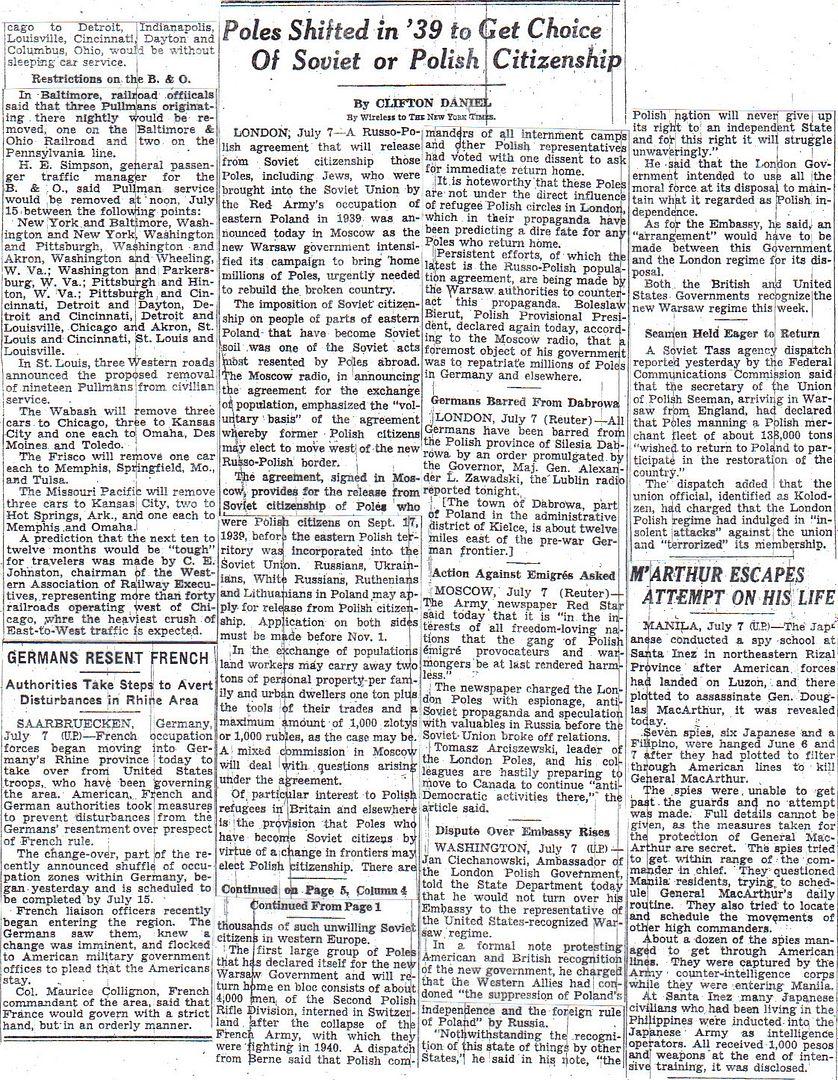
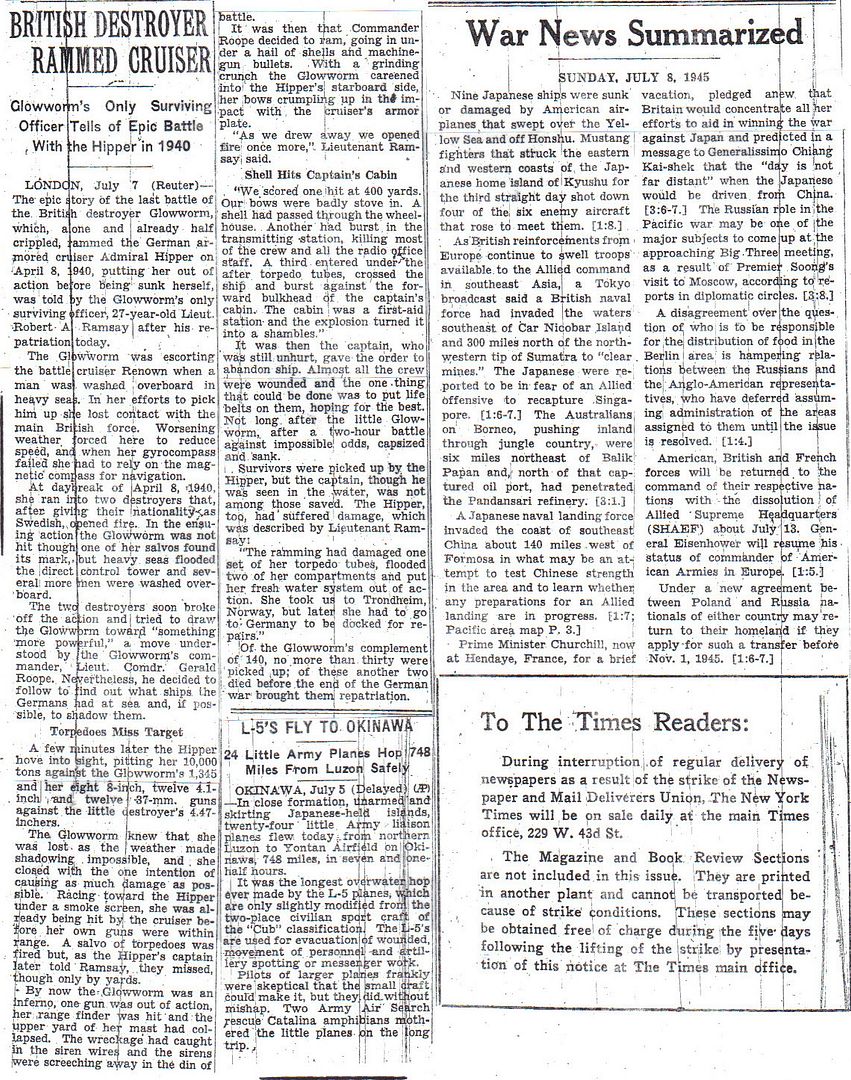
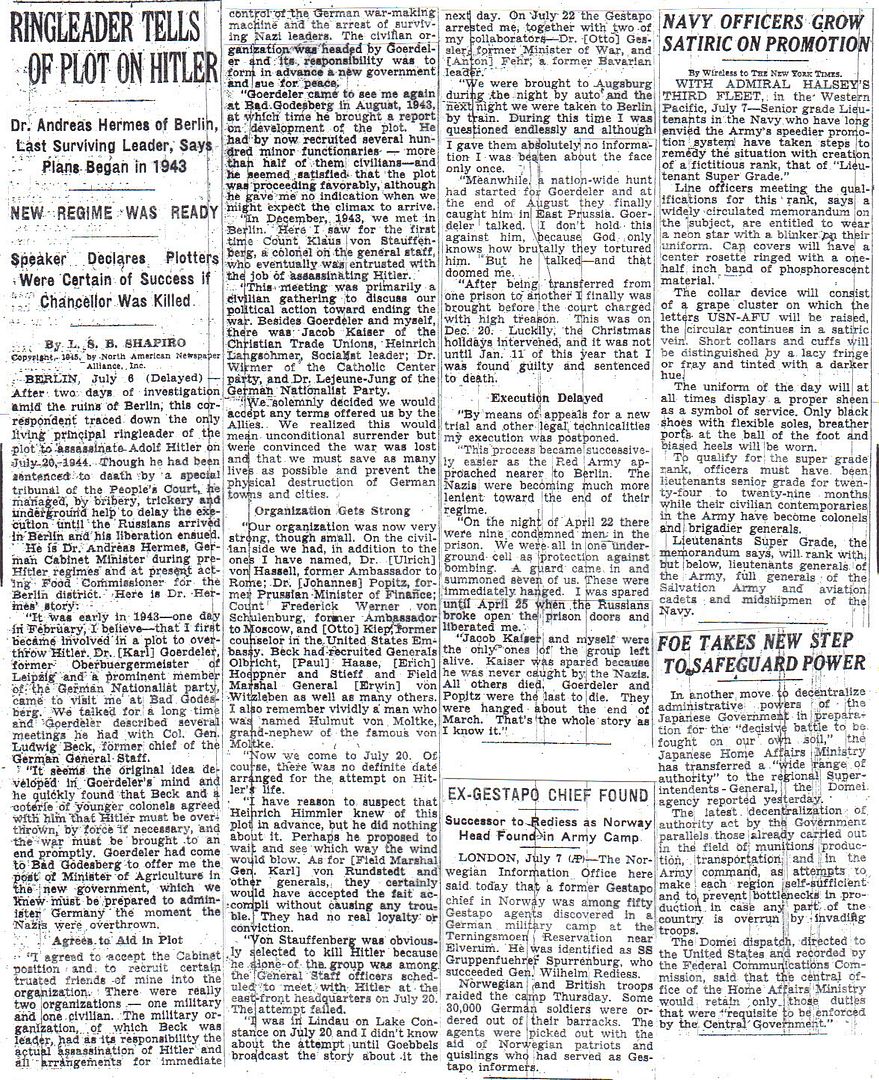
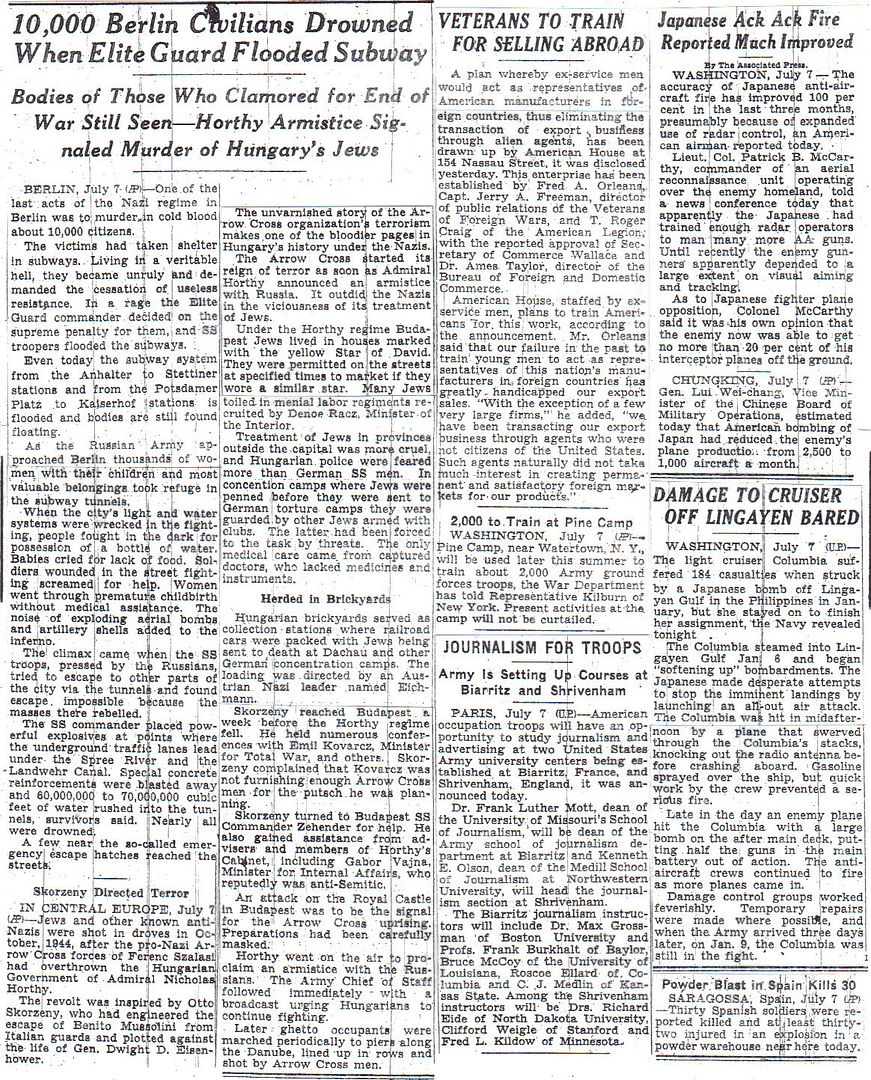
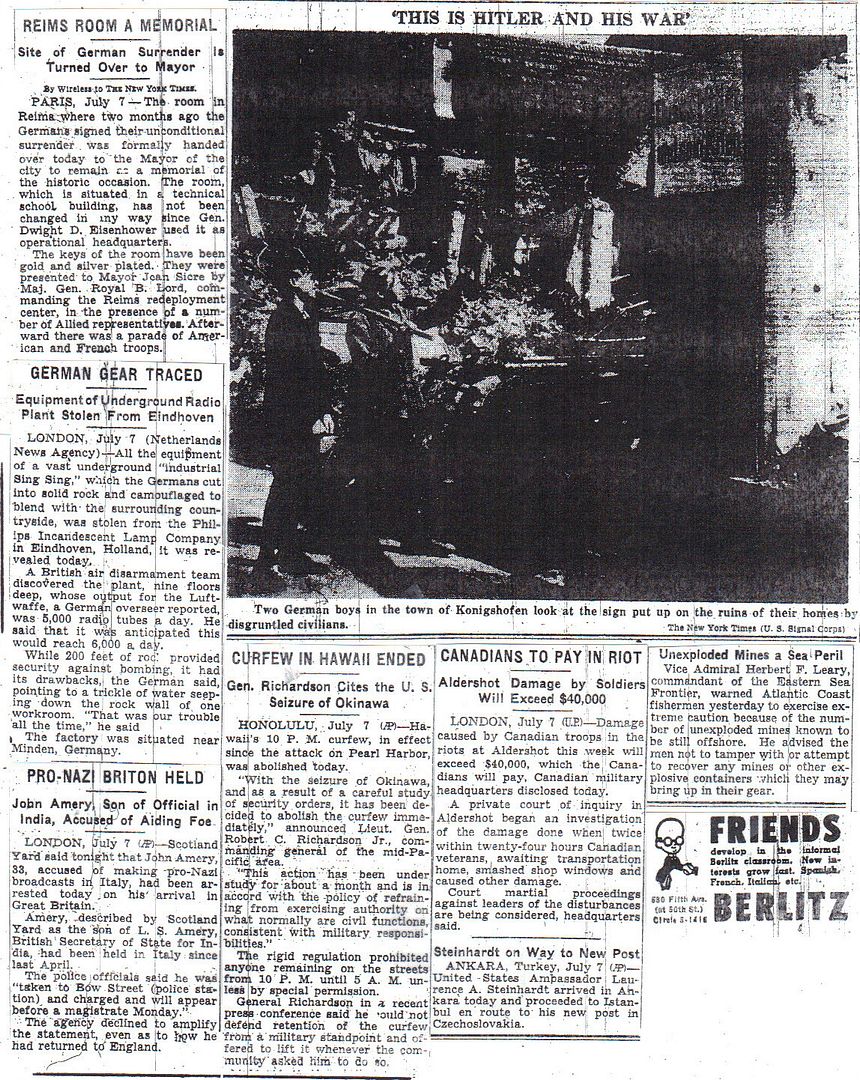
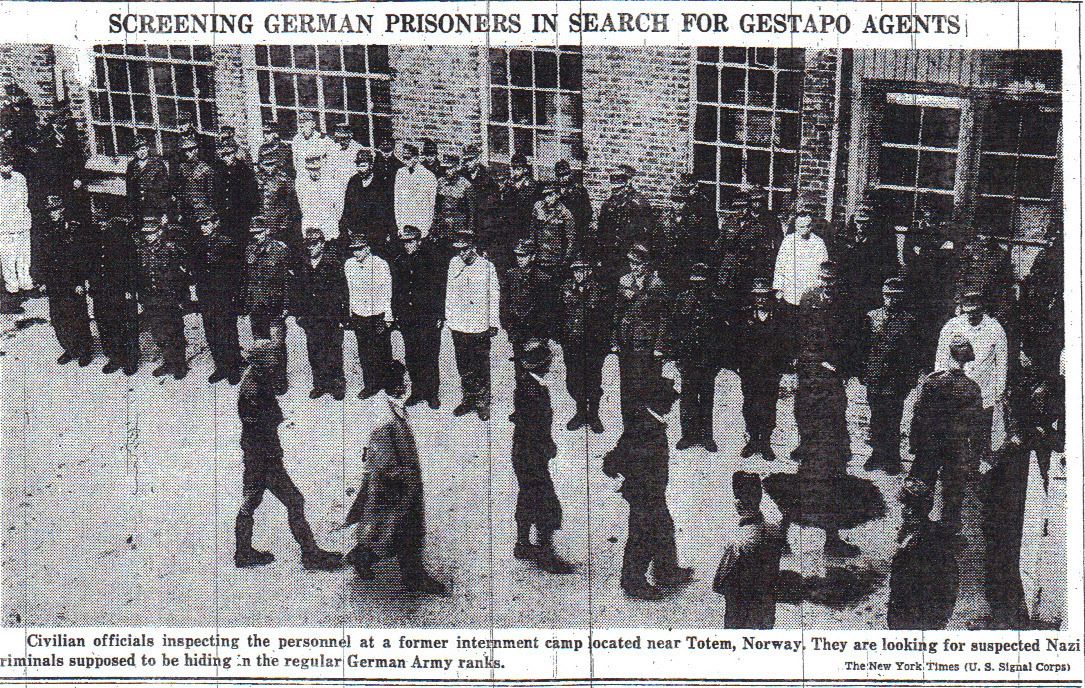
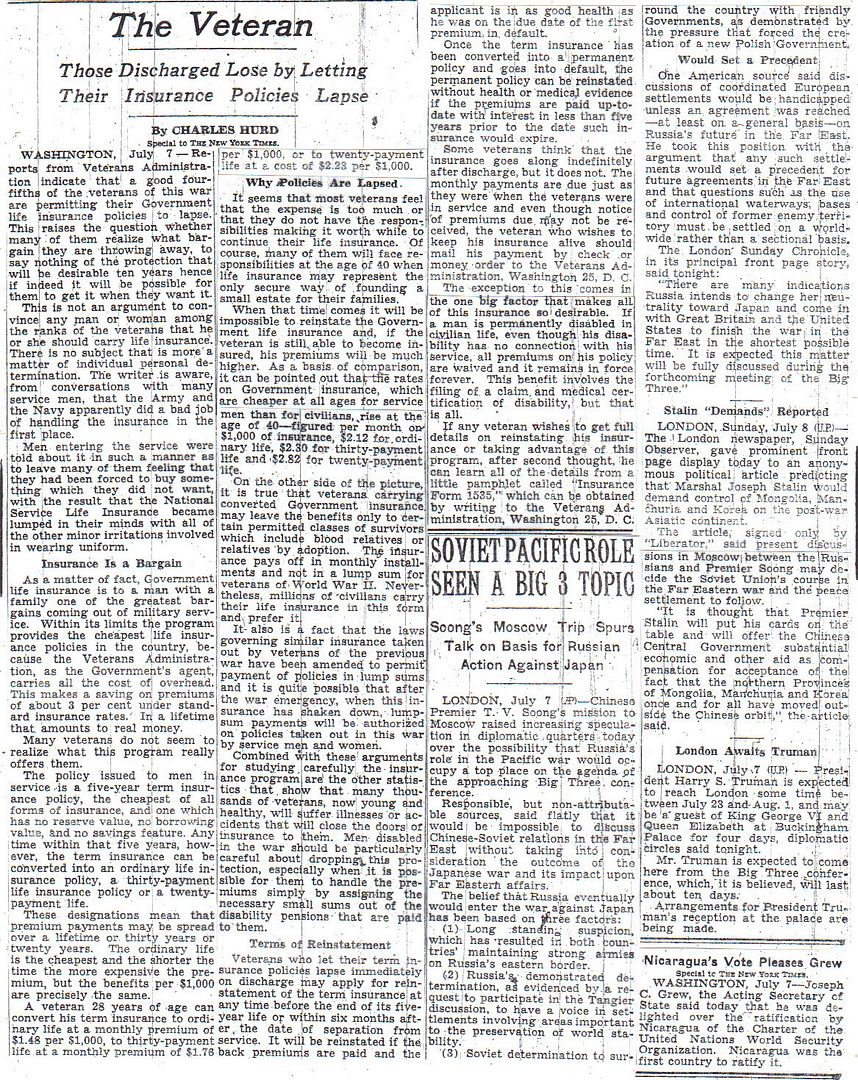
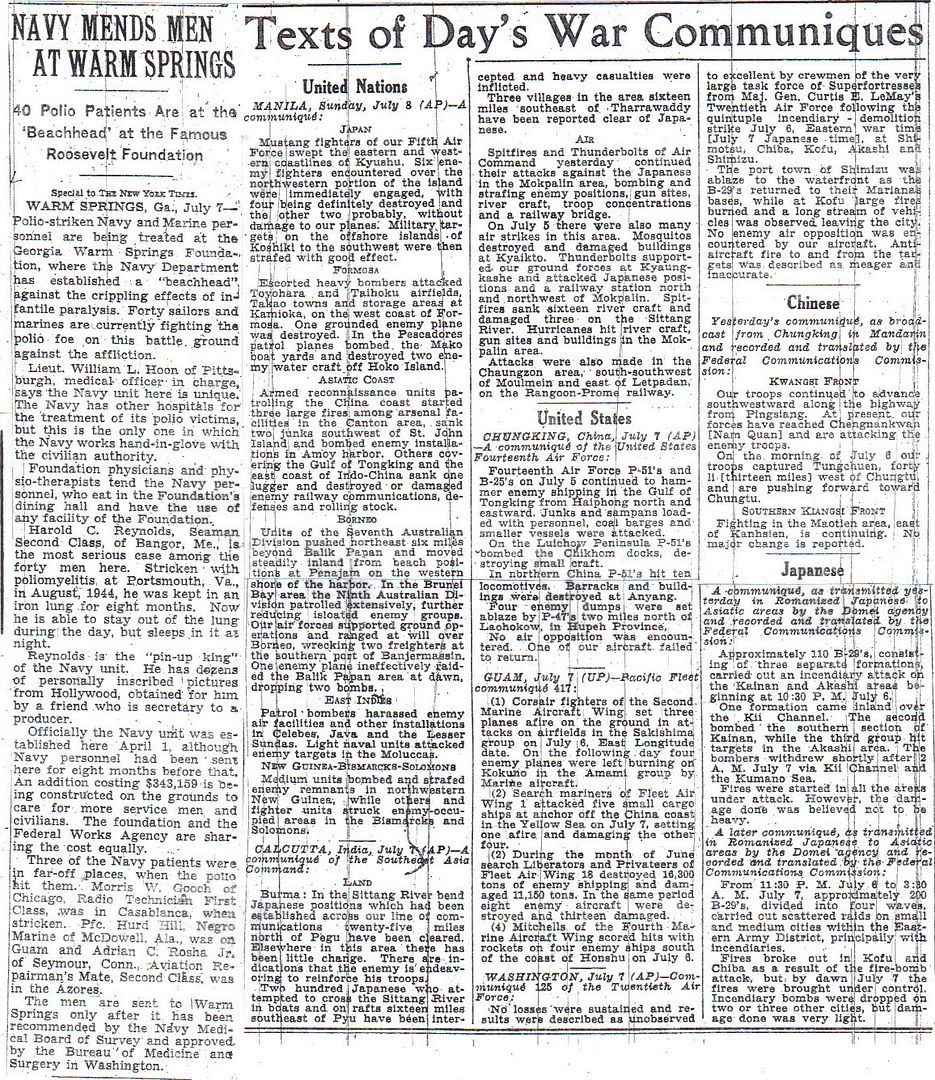
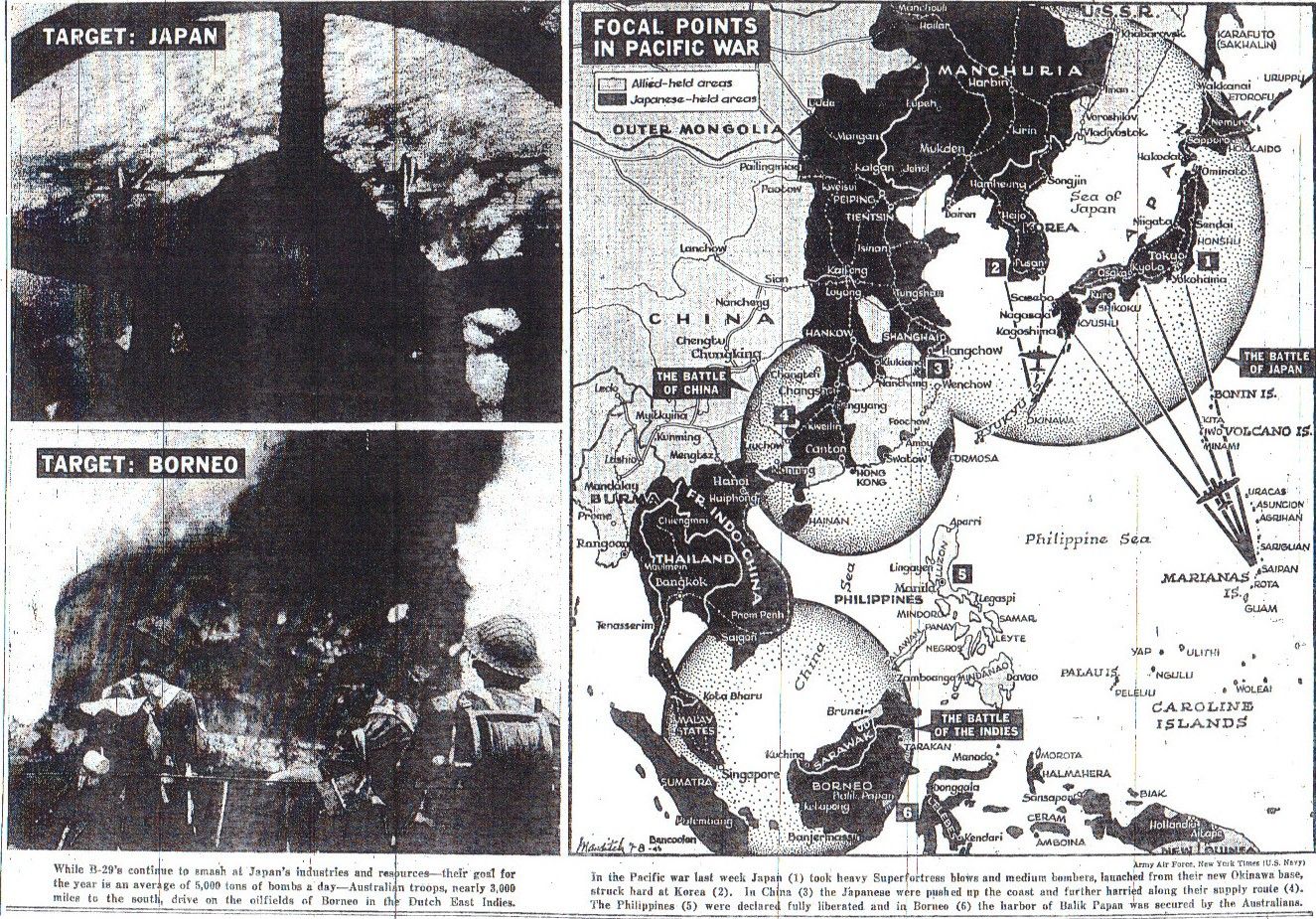
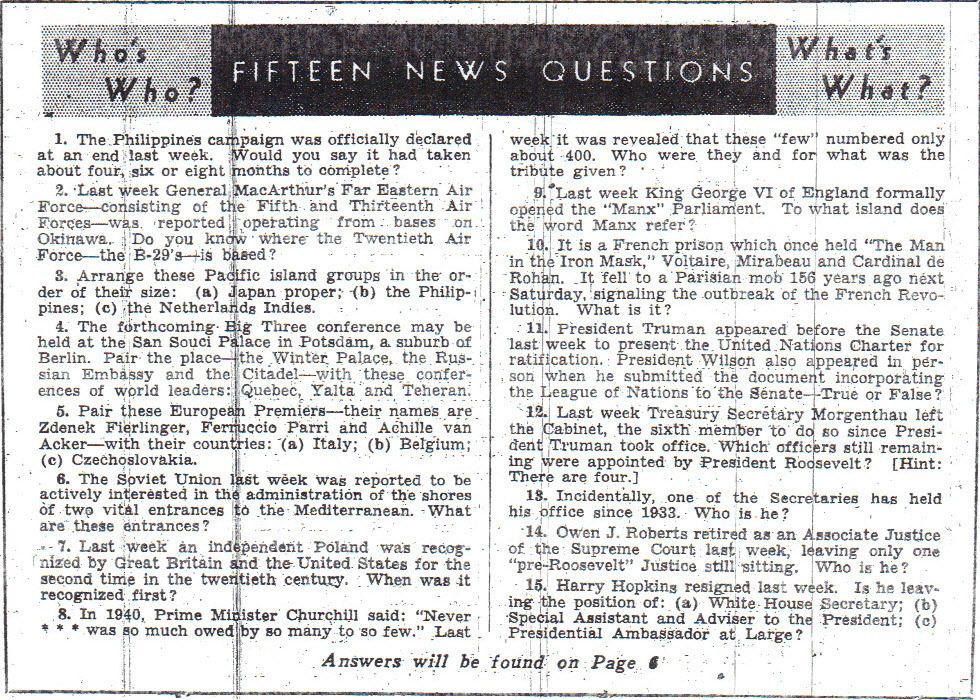
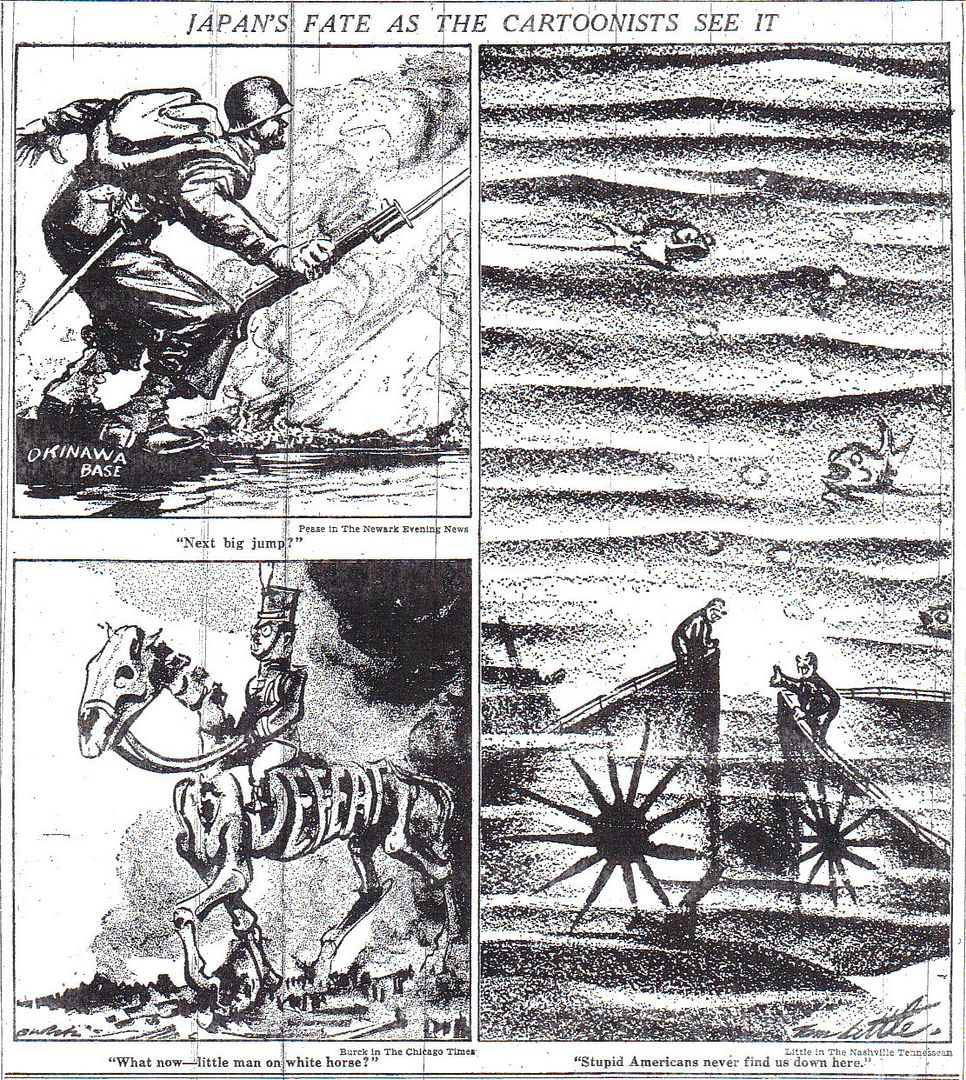
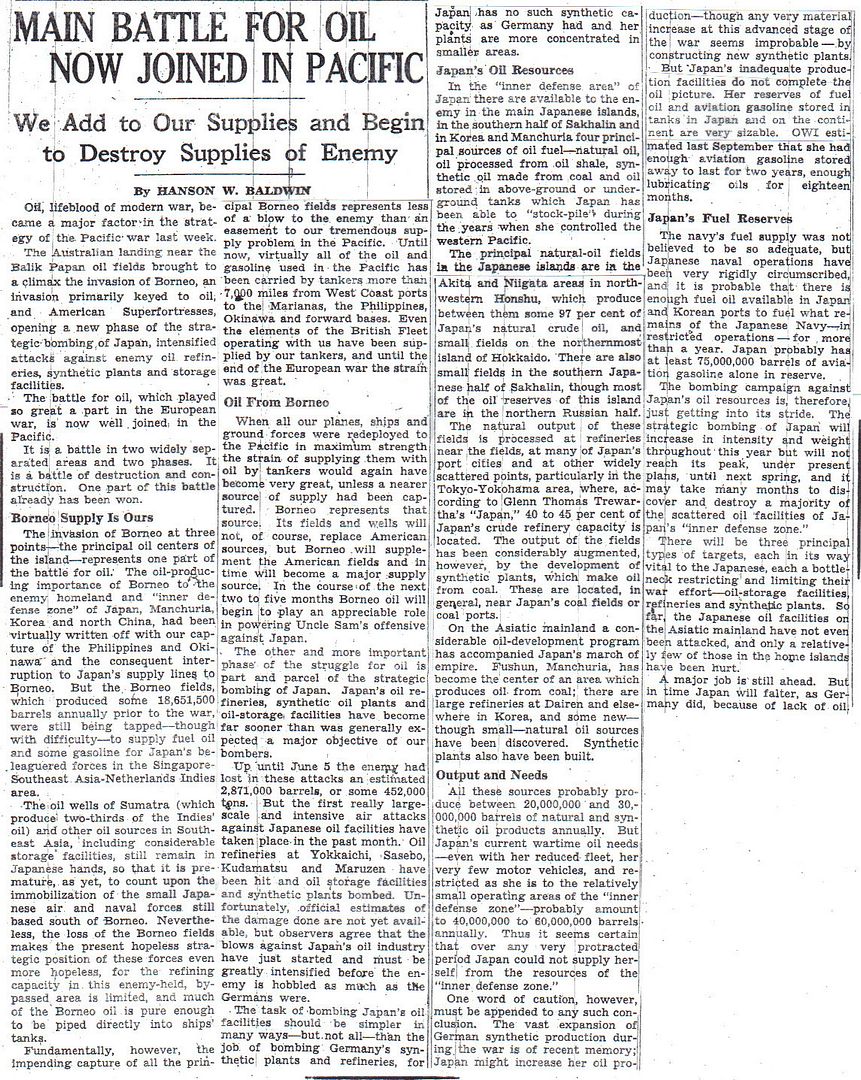
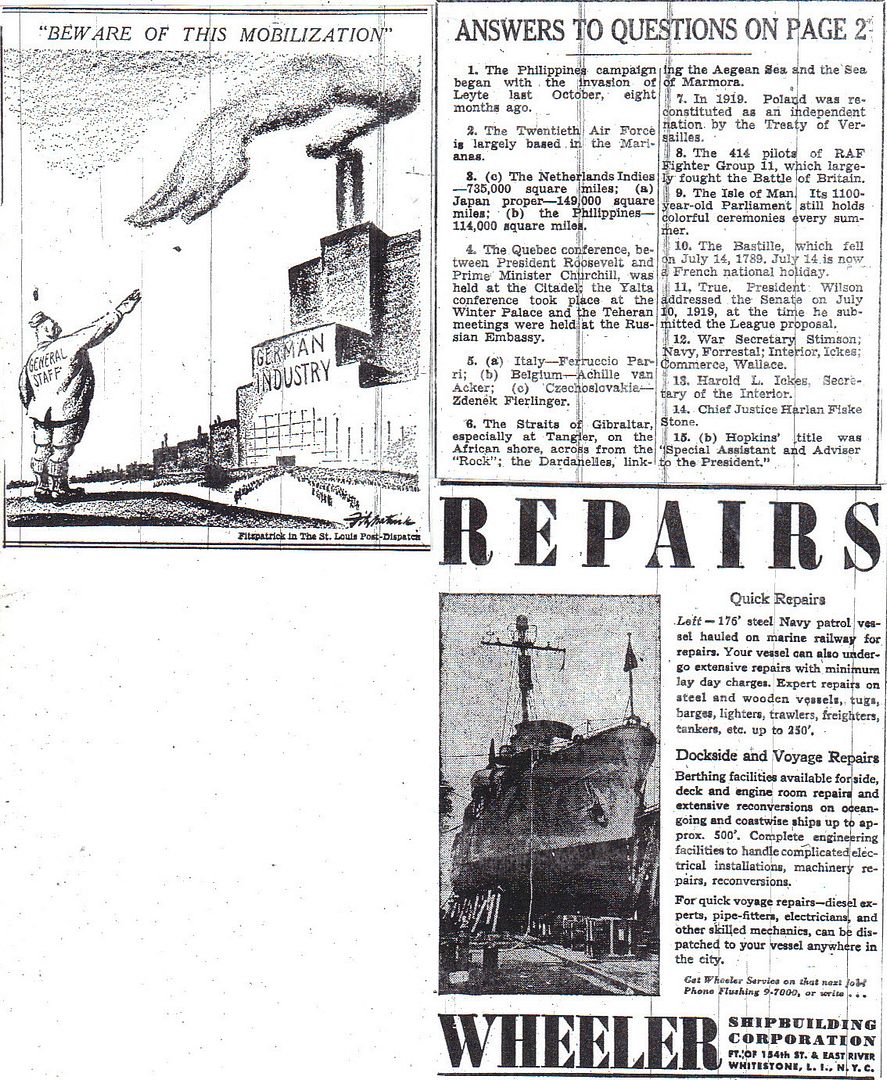
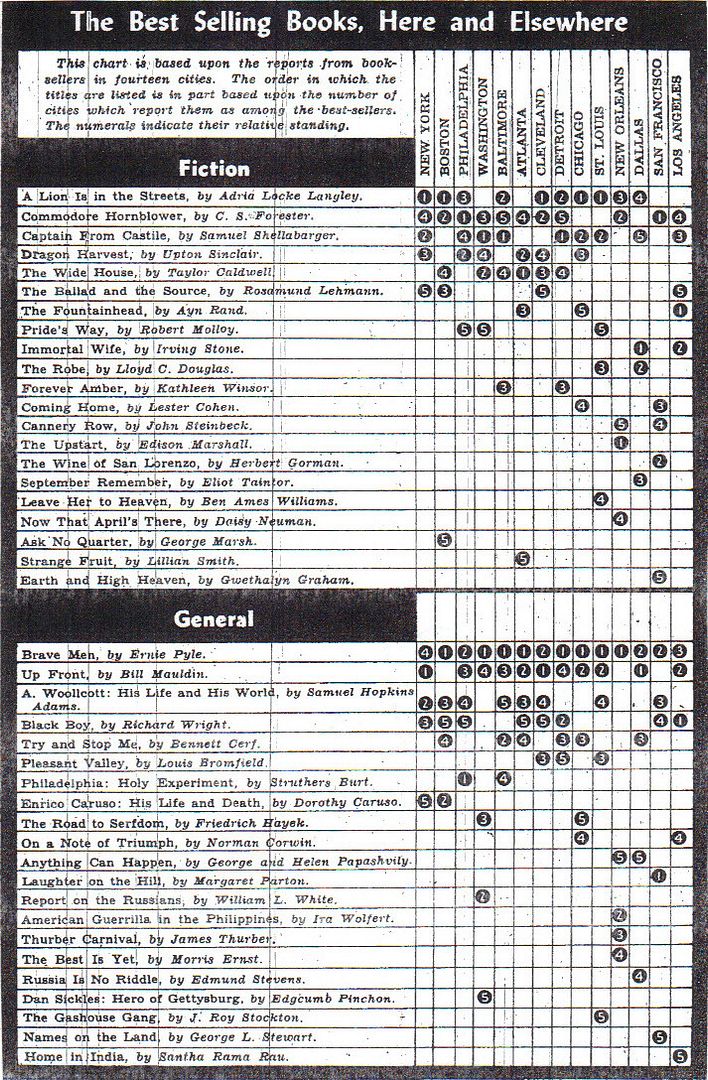
The News of the Week in Review
Focal Points in Pacific War (photos and map) – 20
Fifteen News Questions – 21
Japan’s Fate as the Cartoonists See It - 22
Main Battle for Oil Now Joined in Pacific (by Hanson W. Baldwin) – 23
“Beware of This Mobilization” (cartoon) – 24
Answers to Fifteen News Questions – 24
The Best Selling Books, Here and Elsewhere (from Book Review) – 25
http://www.etherit.co.uk/month/6/08.htm
July 8th, 1945 (SUNDAY)
JAPAN: Two Twentieth Air Force fighter groups (100+) P-51s from Iwo Jima pound airfields and other targets at Hyakuri, Chofu, Tokorozawa, and Yachimata, Japan; 5 aircraft are claimed downed and at least 25 destroyed on the ground; 8 P-51s are lost.
SOUTH CHINA SEA: Dutch Submarine O-19 ran aground on Ladd Reef. Unable to free herself and deep in enemy waters, O-19 was at the mercy of any Japanese warships and planes in the area. Their situation was desperate, but responding to a coded message about O-19’s situation, submarine USS Cod made full speed for the imperilled Dutch submarine and arrived at the scene later that same day. Two days of attempts to pull O-19 free yielded no results and the captains of both vessels agreed that there was no hope of freeing the Dutch sub from the grip of the reef. After removing the 56 Dutch sailors to safety, Cod destroyed the O-19 to keep any of its equipment from falling into Japanese hands. The rescue was the only international submarine-to-submarine rescue in history.
BORNEO: On Borneo, Thirteenth Air Force B-24s and B-25s, supporting Australian forces who arelanding at Penajam, hit the Balikpapan area defensive positions, Samarinda shipyards, various targets along the Samarinda road, and warehouses at Tandjung. B-24s [including some of the Royal Australian Air Force (RAAF)] bomb warehouses at Donggala on Celebes Island.
CANADA:
Corvettes HMCS Asbestos, Moose Jaw and Smiths Falls paid off Sorel, Province of Quebec.
HMC ML 050, 087 and 103 paid off.
U.S.A.: Opinion pollsters asked the following question:
Do you think American soldiers in Germany should be allowed to have dates with German girls?
All Men Women
Yes 30% 41% 22%
No 59% 48% 67%
No opinion 11% 11% 11%
Utah: A soldier opens fire on German PoWs, killing eight and wounding 20.
As one may have noticed while considering the bombings in '44 and '45 on the main islands, whatever was bombed was often rebuilt in place after the war. If it was an oil refinery, an oil refinery was rebuilt; if it was an aluminum plant, an aluminum plant was rebuilt. Here is a list of the major aluminum companies in Japan today; a quick glance at the list will show that their main offices tend to be in Tokyo, Osaka, and...Shimizu. Plus ça change, plus c'est la même chose
Bedford Springs Hotel:
As the war in Europe was coming to a close in the spring of 1945, Allied forces rounded up Japanese diplomatic personnel who had either fled to or were living in places like Sweden and Austria. Officials from the U.S. State Department felt the captured diplomats might come in handy for prisoner exchanges or other tactics and needed a place to house them.
Nestled in the Allegheny Mountains of south-central Pennsylvania, the Bedford Springs Resort was vacant (the owners had plans to renovate at the time), isolated, and less than three hours from Washington, D.C. The resort, founded in 1796, had previously served the war effort as a radio school for the navy. The first group of detainees, including General Hiroshi Oshima, Japanese ambassador to Germany, arrived in Bedford in August 1945.
News of the hotel’s new “guests” spread quickly and angered locals who saw the containment of an enemy nation’s diplomats at a sprawling resort as a slap in the face. “Some of them had sons and daughters, mostly sons, who were interned in Japanese camps and they were treated very cruelly and here we’re putting up these Japanese ambassadors, representatives of their country, in a luxurious hotel,” Bill Defibaugh, the hotel’s resident historian, says.
As always, Homer, thanks for providing this for us.
So what did the Japanese do with military plants? Just retool them for civilian purposes?
In the last 2 months of the war the Japs finally figure out how to use radar to direct AAA gunfire. Wow. Page 15.
I had missed that—thanks for pointing it out.
Japanese industry in the early 20th century was controlled by a business group known as the zaibatsu (財閥), which was formed by the Meiji Emperor in the late 1800s in order to kickstart Japan's industrialization, and then switched over largely by the Showa Emperor (Hirohito) to military production.
After the war the zaibatsu were broken up by SCAP and MacArthur, but soon after the peace treaty the companies that had formed the zaibatsu re-formed, and the plants they had before the end of the war were rebuilt. One big difference was that while the pre-war zaibatsu were vertical monopolies, the post-war replacements were more like horizontal oligopolies, known as keiretsu (系列); they were still manipulated by the government, but for the purposes of building first an export-driven economy, then a consumer-driven economy.
Most Japanese companies today find themselves behind the curve in terms of both innovation and market share; South Korean corporations have been more innovative over the last generation, while Chinese corporations with their cheap labor and export-driven economy (the same thing the Japanese did in the 50s and 60s) have taken over more market share. I really can't point to a Japanese corporation that has figured out how to get out of this dilemma--with the possible exception of Nissan, which has done it by going all-out global. Lots of other Japanese firms, like Toyota, Sumitomo, and Mitsui, have tried, but with less success, for different reasons individual to each.
Until the planes started showing up in force in late 1944, it never occurred to the Japanese that they would have to.
You have to remember that the Japanese were firmly convinced, as a result of the failure of Kublai Khan in the middle ages, that no foreign force would ever be able to do appreciable damage to the Japanese home islands, that the gods would keep such invaders from succeeding. By the time they were disavowed of the notion, their resources were so spent that setting up such technology would have been difficult.
There were two things that happened in 1945 that the Japanese never ever expected. The first was that they were defeated in a humiliating manner. The second was that their conquerors essentially let them go--other than the military leadership--without any imposed penalty. For us this was a combination of Christian forgiveness and the realization that we needed Japan in the face of the communist threat, but for them was an even greater humiliation, because it did not give them a chance to expiate their guilt through suffering. It is why their children despised us in the 1980s when it looked to all like Japan was going to conquer the world economically--but the Baby Boomer grandchildren of the militarists, who now run the government and the businesses, are no longer tied to the war guilt, and they deal with America as both an ally and an equal, a relationship that is bound to improve when the present resident of the White House ceases his residence.
And one more thing. There was an interesting, if saddening, tangent to the US humiliation of Japan in the women's World Cup on Sunday. There were a million Twitter references to the win, but just as many to Pearl Harbor, Hiroshima, and Nagasaki (cf. here). That fish was fried 70 years ago; we have more important fish to fry today. The Japanese were the seconds biggest bastards of the first half of the 20th century, with the Stalinists being the first; they both made the Nazis look like pipsqueaks, and the Japanese deserved everything that happened to them and more. But it is essentially impossible, except in the sense that we are all in sin, to see the Japanese ever doing it again. When I cannot sleep at night, it is because of what I think the jihadists may do to my children, or what the totalitarian left is already doing to my children, not because of the resurrection of a notorious Nippon.
Good insights; thank you. I’ve seen Japan’s economic recent economic dilemma referred to as “the Lost Decade.” I suspect the economic trends you referred to are a primary cause.
I’ve often wondered if China were likely to experience the same issues if their populace ever put themselves in a position to demand less pollution and higher wages.
We followed his exploits last November when he commanded the 1/34th Infantry in the Battle of Leyte.
On very short notice Clifford's Battalion was landed behind Japanese lines and ordered to take and hold at all costs Kilay Ridge, high ground dominating the Ormoc Valley, down which we were advancing. This was after three weeks of continuous combat. Often cut off and short on supplies Clifford's Battalion for three more weeks defeated every Japanese counterattack thrown at them.
Having read the details in the U.S. Army "Green Book" history of the Leyte Campaign, I think he was one of the finest small unit leaders in the Army in either Theater.
After Leyte, Clifford was promoted to Colonel and given command of the 19th Infantry. He died while characteristically leading the charge into Davao.
Here is a bio. http://www.findagrave.com/cgi-bin/fg.cgi?page=gr&GRid=131656965
The subway story got to me too. One last horror from that horrific regime.
Sounds like CMOH stuff; at least he got the Silver Star.
Extraordinary courage was an everyday occurrence.
They're doing it now, and you're beginning to see the effects. Xi thinks he can control it, but 3000 years of Chinese history says otherwise.
Frankly, the only thing that prevents my deep despairing despondence is the certainty that Yahweh/Jesus/Spirit are in complete control and will (sooner, I think, than later) not only rectify it all but will also deliver His children from even the presence, much less the power, of evil.
Disclaimer: Opinions posted on Free Republic are those of the individual posters and do not necessarily represent the opinion of Free Republic or its management. All materials posted herein are protected by copyright law and the exemption for fair use of copyrighted works.